Office of Research & Development |
 |

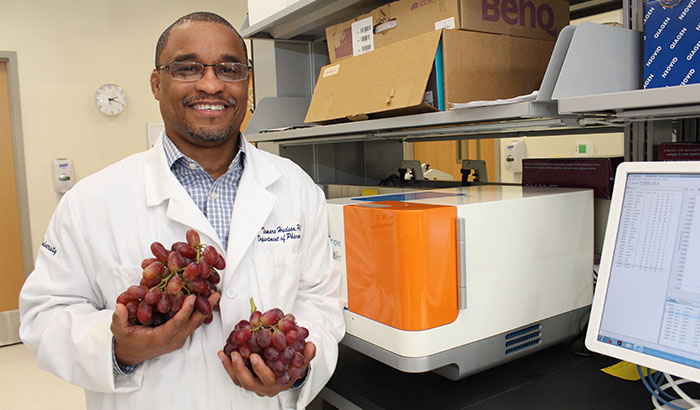
Dr. Tamaro Hudson is studying the effect of muscadine grape extract on prostate cancer. (Photo by Mitch Mirkin. Non-muscadine grapes shown for illustrative purposes.)
March 5, 2019
By Mitch Mirkin
VA Research Communications
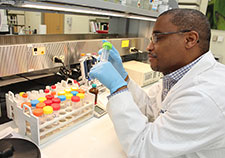
Dr. Tamaro Hudson is a researcher with the Washington DC VA Medical Center and Howard University. (Photo by Mitch Mirkin)
For years, the American Cancer Society and other groups have advised eating a colorful mix of fruits and veggies to help ward off cancer. At the same time, scientists continue to hunt for specific chemicals within plants that have special tumor-busting power.
Does the antioxidant-rich muscadine grape harbor one of those compounds? That question is being pursued by a group that includes Dr. Tamaro Hudson at the Washington DC VA Medical Center.
Hudson is also an assistant professor of pharmacology department at Howard University. He is doing experiments in cell cultures and mice, and collaborating with a Johns Hopkins team on a clinical trial.
The lab experiments have been promising. In January of this year, Hudson and colleagues published a study in the Elsevier journal Heliyon showing that an alcohol-based extract made from the skin of muscadine grapes decreases the growth of prostate cancer cells, through a process called cell cycle arrest.
"We were able to show the ability of the grape extract to reduce tumor growth."
“We were able to show the ability of the grape extract to reduce tumor growth,” says Hudson.
The experiments used a cell line, known as PC3, that originated back in 1979 in a 62-year-old Caucasian man with aggressive prostate cancer that had spread to the bone. The cells have been an important resource for cancer and drug labs worldwide.
Hudson’s team applied the grape-skin extract to cells in Petri dishes, and to tumors that had grown in mice injected under the skin with a saline solution containing the cancer cells.
One of the collaborators on the research is Dr. William D. Wagner, a professor at Wake Forest School of Medicine. He owns a company called Muscadine Naturals that makes dietary supplements from muscadine grapes grown locally in North Carolina. But Hudson’s study used an extract from a different source, from purple muscadine grapes grown in south Georgia.
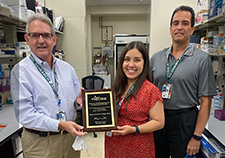
VA center training the next generation of researchers in blood clots and inflammation

AI to Maximize Treatment for Veterans with Head and Neck Cancer
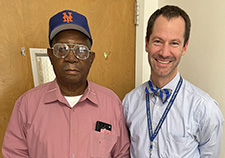
Veterans help find new cancer treatments
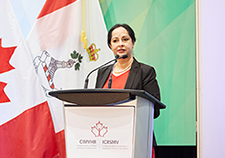
Million Veteran Program director speaks at international forum
Hudson and Wagner are also part of a group conducting a phase 3 clinical trial. It’s sponsored by the Sidney Kimmel Comprehensive Cancer Center at Johns Hopkins University in Baltimore. The trial has other sites, as well, but none within the VA system.
The trial involves 80 men who had prostate cancer in the past and underwent treatment, but now have the disease again, as evidenced by their rising PSA (prostate-specific antigen) levels. About 15 to 40 percent of men who go through an attempt at curative therapy for prostate cancer—such as surgery or radiation—will develop recurrent disease.
According to the researchers, these men have limited conventional treatment options. As such, “they are excellent candidates for innovative treatments hypothesized to slow the progression of clinical prostate cancer and delay the development of metastatic disease.”
The men are taking eight capsules daily, each containing 500 mg of dried, powdered muscadine skins. Even if the grape product slows the spread of the cancer but doesn’t eradicate it entirely, that might buy the men additional years of symptom-free living.
The trial also has an interesting genomics, or personalized medicine, aspect. An earlier phase 2 trial by the group—designed to confirm the safety of the grape therapy and establish the most effective dose—failed to show a statistically significant difference in outcomes between men who got the grape product and those receiving a placebo. The researchers gauged success by how long it took the men’s PSA levels to double. That’s a standard measure used in men with recurring prostate cancer. The longer it takes for the PSA number to double, the better. That means the cancer is slower-growing.
But a subgroup of men in the phase 2 trial who had certain variant of a gene called SOD2 did show a measurably better response. There weren’t enough of these men to sway the overall outcomes of the earlier trial, but the current phase 3 trial includes only prostate cancer patients with this genotype. Some will get the grape capsules, and others a look-alike placebo.
“This will indicate whether it was a true effect,” Hudson says.
The gene variant at play is the alanine/alanine SOD2 allele.
Hudson says researchers aren’t sure yet roughly what percentage of men with prostate cancer in the general population have this gene variant.
Meanwhile, Hudson and others are working to identify what exactly in the skin of the muscadine grape combats cancer. He’s pretty sure it’s not the well-known compound resveratrol. Muscadine, unlike most other red grape varieties, has only very modest levels of that super antioxidant. But it does have plenty of other compounds shown in lab studies to have anti-cancer activity, such as ellagic acid, kamperfol, and quercetin.
In fact, there are dozens of compounds, or phytochemicals, in these dark-skinned grapes, as there are in any fruit. Isolating which ones affect cancer is tedious work, says Hudson. But if scientists can isolate the most relevant compounds, in theory they can develop a more potent therapy. It could also make it more feasible for patients to consume the requisite amount. After all, if a person set out to eat enough muscadine grapes to equal the amount given in capsules to the clinical trial participants, they’d have to eat more than 10 pounds daily.
Hudson does note that as his group chemically breaks down the dried and pulverized grape skin into its various components, and tests those against cancer cells, the therapeutic effect wanes.
“The issue becomes whether you want to remove those components from the plant [or fruit] itself. If you isolate it out, does that increase the [anti-tumor] activity?”
Consistent with his lab’s findings so far, it could be that the final product will in fact be as close as possible to the whole grape skin, as it exists in nature, with all its various polyphenols and other compounds intact.
“The field is slowly moving away from [a more fractionated approach],” he adds. “If you can keep those constituents together, in the natural environment of the plant, they all work in concert.”
Hudson has received funding from the Charles and Mary Latham Fund, as well as a Historically Black Colleges and University Research Training Award from VA.
VA Research Currents archives || Sign up for VA Research updates